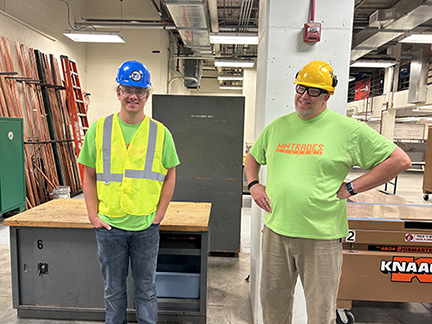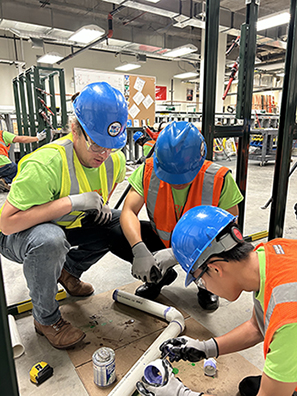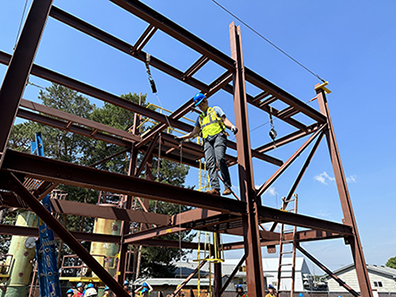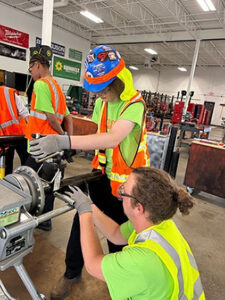MTA Lead Jack Roessler Highlights the Importance of Hands-on Learning and Experience Offered by the Minnesota Trades Academy
Saint Paul, Minnesota – In a system of traditional learning from lectures, textbooks, and slides, some students may find that their aspirations for a future career are not covered in school in a way that is conducive to their learning.
That’s part of the reason why the Minnesota Trades Academy has been so successful.

Photo: Jack Roessler and a fellow MTA Lead on the job.
Minnesota Trades Academy (MTA) Lead and educator Jack Roessler believes hands-on experience and gaining a basic introduction to construction trades are critical to students’ development. He is dedicated to showing students that there are many career pathways and opportunities out there for them to explore.
Minnesota Trades Academy (MTA) is a paid summer construction internship experience for high school youth with the goal of preparing youth for a fulfilling career in the construction trades through skill development and access to good jobs with good benefits in the construction industry. MTA supports the Construction Careers Foundation’s mission to “increase the diversity of entrants into the construction trades and to enhance young people’s access to construction-related employment opportunities.”
Roessler initially got connected to the program when a former MTA Lead recognized Roessler’s interest in youth career development and recommended that he work with the program. From a young age, Roessler learned the principles of hands-on experience and resourcefulness by working with his father and grandfather on their farm. Meanwhile, he gained a passion for education watching his mother’s work as an educator. He recently graduated from the University of Minnesota with an agricultural education degree and is now an agricultural educator at the Academy for Sciences and Agriculture, a charter school located in Vadnais Heights.
In his experience, Roessler feels there is a strong overlap between agriculture and construction as they both call attention to production and safety and require high levels of hands-on, technical skill. However, the biggest interest Roessler has in construction career preparation is the opportunity it offers for those who seek a different path out of high school that does not require a four-year degree.

Photo: Jack Roessler instructs MTA interns in a hands-on environment.
“I’m someone who really enjoys hands-on learning and the application side of things where students can learn something at school and go home and apply that knowledge immediately,” said Roessler. “To me, I think that is a fair representation of trades as a whole — of being able to learn on the job with your hands and apply the knowledge that you learn right away. When I heard about MTA and how they visit all these different trade unions and do hands-on learning – it paired together really well with my own experiences.”
As a Lead, Roessler teaches students the importance of gaining a strong team mentality, owning one’s responsibilities, building self-discipline, and creating a supportive and cooperative work environment. Roessler finds value in hands-on experience because it enables students to make mistakes and ask questions where they might not be able to find the answers on their own.
“I try to cultivate an expectation that you’re going to mess up and that’s okay. I think sometimes students put a lot of pressure on themselves to perform really well in the classroom, even if they don’t understand something,” said Roessler. “I don’t expect you to come in and know everything, but I need you to not be afraid of messing up. You need to take risks and you need to do something that you’re uncomfortable with – discomfort is where some of the biggest amounts of growth can happen.”
Setting High and Realistic Expectations at MTA
Unlike sitting down in a classroom at school, MTA is a learning and growth opportunity that has the expectations of a real job. Showing up on time, cleaning up after yourself, helping others, and wearing the correct working attire, all contribute to shaping students into reliable and successful workers in the trades.

Photo: Jack Roessler leads by example.
“For us at MTA, we hold students to the high expectations that unions and general contractors are going to have, but we’re also going to help you reach that expectation if you’re not there yet,” said Roessler. “We’re going to support you through the pressure as a summer intern and provide you with the knowledge that you’re going to need. There’s plenty of help and opportunity around, but you have to make sure to ask for it.”
After the second week of the program this summer, Roessler already started to see a change in his students simply from the routines and expectations being enforced. He’s pleased by the passion demonstrated by students with the questions they ask. How do primer and glue go together? What are the best work boots to buy? When you’re done cleaning up your station, where else can you offer help? Because of the mentorship environment that MTA has created, students can ask and receive real-time answers to the problems they face.
It’s all a part of the bigger picture – team mentality. Working in the trades means taking ownership of your work, pride, and safety alongside your co-workers to benefit the team. MTA exposes students to these working environments and nudges them in the right direction to make a seamless transition into the industry with a full-time job.
Extending a Helping Hand
As an educator, Roessler is deeply invested in the success of his students by helping them recognize their areas of improvement and giving them advice on how to move forward. He points out to students when others need help cleaning up or aids them on how to communicate problems or issues they may be having with a project.

Photo: Jack Roessler instructs MTA interns in a hands-on environment.
“I am not a huge fan of the term ‘Oh, well, that’s common sense’ because we all had to learn it at some point,” said Roessler. “I want to meet students wherever they’re at. My expectation is that we grow and improve from there together.”
Roessler’s teaching values align directly with MTA, in creating learning environments that offers a landscape of opportunity and support. For eight weeks out of the summer, students learn from multiple trade unions under a lead, getting real-world training that’s hard to experience without the guidance and knowledge of those who are familiar with the industry.
“There’s a ton of support. When it comes to how many different trade unions are willing to open their doors, welcome us in there, and take time out of their day, as well as some financial support donated by these unions and other protective equipment – there is just a lot of people coming together for these students. This really is such a fantastic trades program and I think it is going to be doing a lot of great work in the future,” said Roessler.
Educators: Get Involved Today
Educators seeking guidance in informing their students about a career in construction, or hoping to pass along the opportunity to join the Minnesota Trades Academy, can visit the Resources for Teachers page on the ConstructionCareers.org website.
Students and Parents: Connect with resources at ConstructionCareers.org
Those seeking guidance on learning about a career in the construction industry can contact Charlie Gill Trades Navigator for the Construction Careers Foundation at charlie.gill@constructioncareers.org to receive personalized support in entering a career in the union building trades.
Students, parents, and educators can visit ConstructionCareers.org to explore 30+ careers in the union construction industry, have access to valuable information regarding apprenticeships, read about the experiences of current construction apprentices in Minnesota, and more.
To learn more about the Minnesota Trades Academy, visit here.
